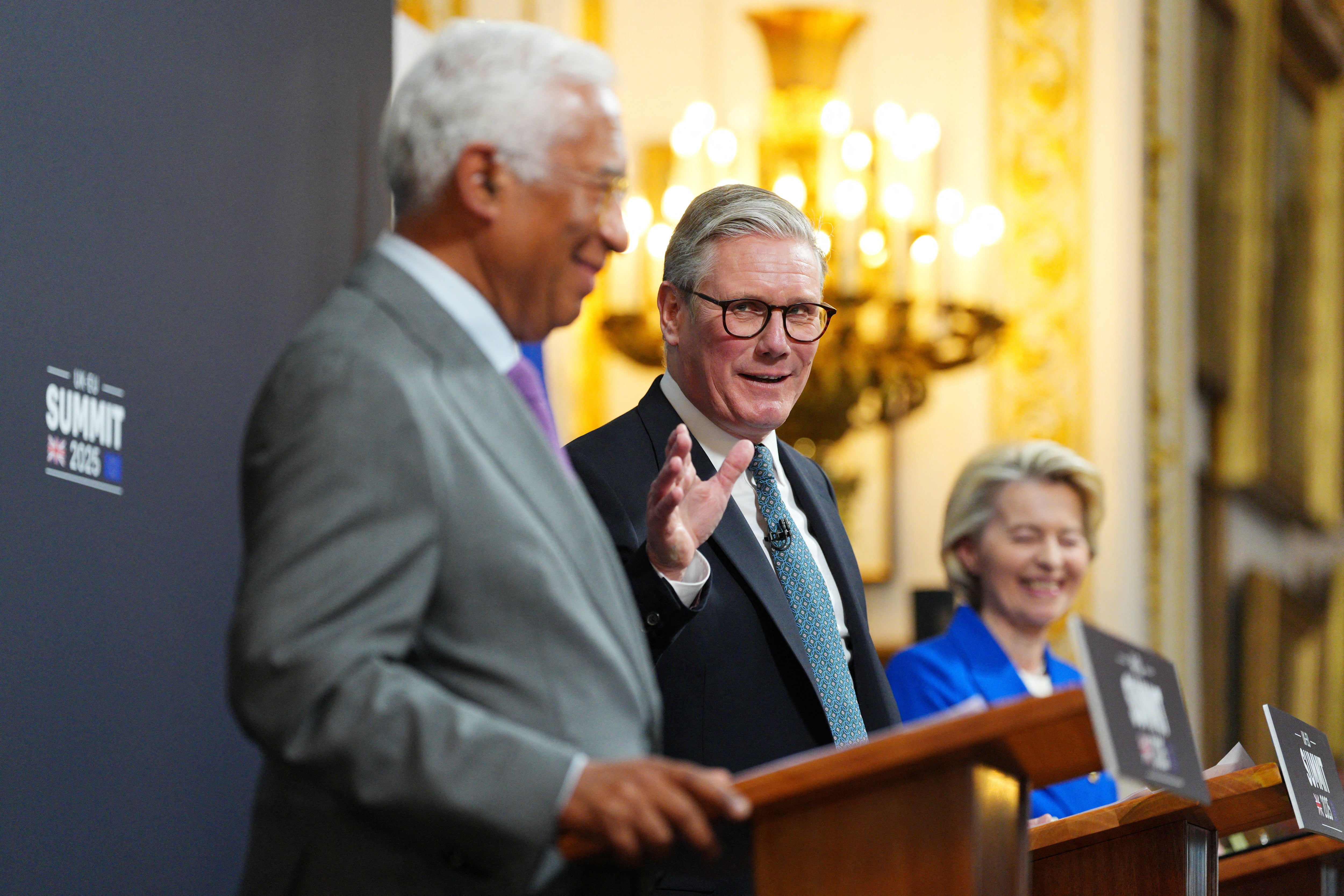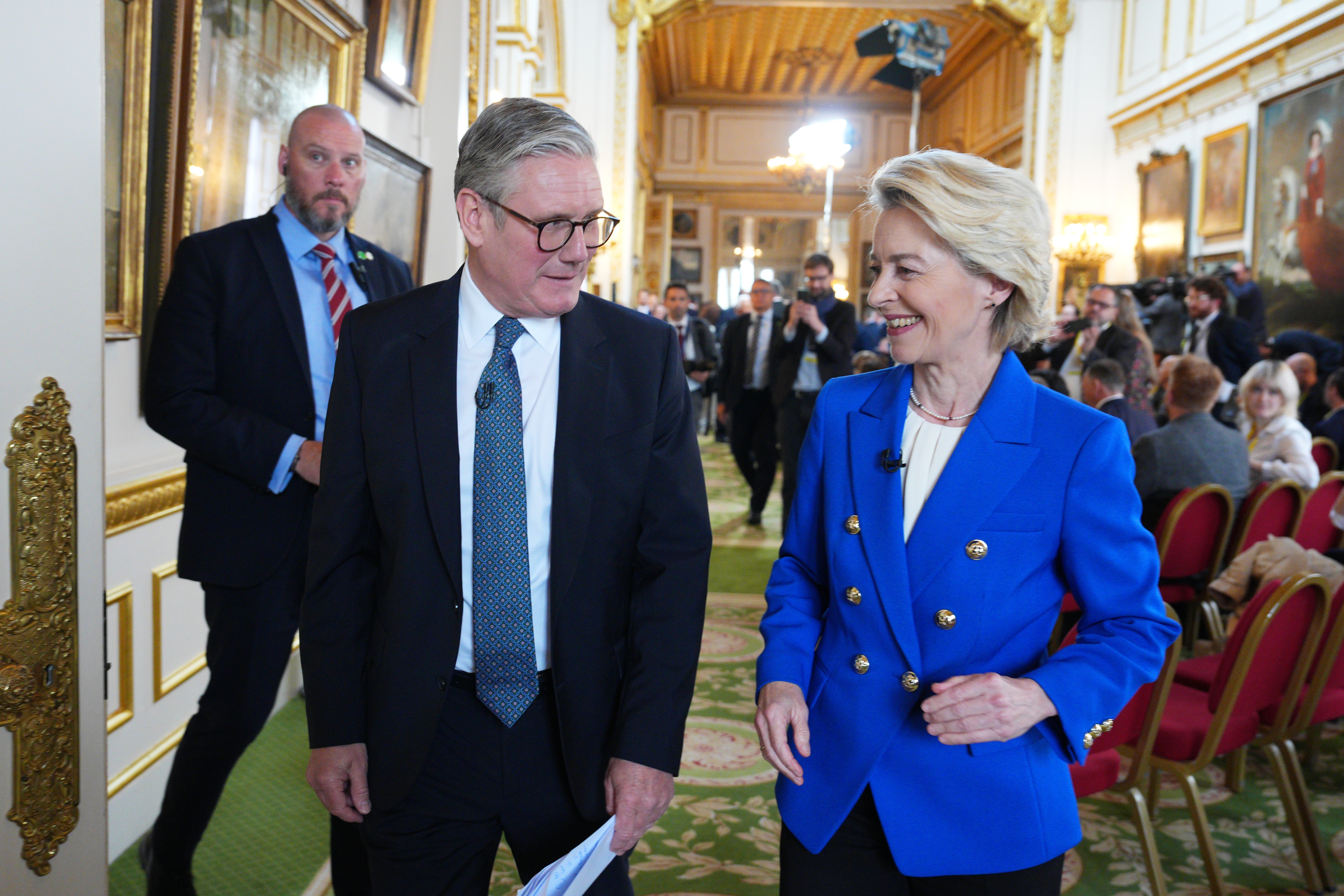ARTICLE AD BOX
Sir Keir Starmer today “turned a page” on Britain’s relations with the EU as he ushered in a “new era” of cooperation and friendship with his landmark Brexit reset deal.
A clearly jubilant prime minister said the deal — his third major international agreement this month after securing trade deals with India and the US — would be a “win-win” for both sides and showed Britain is “back on the world stage”.
European Commission president Ursula von der Leyen described it as an “historic moment” as she appeared alongside the PM at a press conference in London, just hours after frantic negotiations concluded to get the deal over the line.
“We are turning a page,” she said. “We are opening a new chapter in our unique relationship.”
The agreement, which officials claim will boost the UK economy by £9 billion by 2040, appears to be a major coup for the Labour leader with “the pragmatic and positive” elements of removing red tape and border checks lauded by some.
It represents the first serious attempt to fix the harms caused by Brexit from Boris Johnson’s flawed deal in late 2019 which Rishi Sunak tinkered with last year in the Windsor Framework.

The PM faced accusations of “surrender” on fishing, as well as his failure to get agreements on defence and youth mobility.
The key elements of the deal — which still has significant areas to be finalised — include:
- British tourists being allowed to go through fast track e-gates at European airports, meaning they will no longer be required to join lengthy queues at borders
- A 12-year extension of an agreement for EU trawlers to access UK waters until 2038
- The scrapping of some routine checks on plant and animal products, meaning British burgers and sausages will once more be allowed into the EU
- A new defence agreement, although UK defence firms will still have to wait for access to the 150 billion euro EU defence procurement scheme
- An open-ended agreement to slash red tape on food and drink exports and imports between the UK and EU
- Dog and cat owners being able rejoin the EU pets passport scheme
But there is still no confirmed youth mobility scheme in what will be a disappointment for 18 to 35-year-olds in the UK and EU. The two sides have agreed to co-operate on a “youth experience scheme” but the details have not yet been confirmed.
Heralding his latest deal after six months of intense discussions, the prime minister insisted that it is “time to put the stale old arguments behind us” and called on the EU and critics in the UK “to look forward not back”.

While the government had acknowledged privately that the agreement would anger both Rejoiners and Brexiteers, it appears to be another triumph for Sir Keir’s diplomacy in his first 10 months of government.
The deal helps Sir Keir put the UK as a trade hub at the heart of a tumultuous international scene which allows the country to have strong trading relations with it all its main allies in what one senior minister described as “a complex jigsaw where all the pieces hate one another.”
He said: “It’s time to look forward. To move on from the stale old debates and political fights to find common sense, practical solutions which get the best for the British people.
“We’re ready to work with partners if it means we can improve people’s lives here at home.
“So that’s what this deal is all about – facing out into the world once again, in the great tradition of this nation. Building the relationships we choose, with the partners we choose, and closing deals in the national interest. Because that is what independent, sovereign nations do.”
Referring throughout the press conference to the prime minister as “Dear Keir”, Ms von der Leyen was keen to praise him for his “leadership” and paint it as a personal victory for Starmer.
It was a story of "natural partners standing side-by-side on the global stage", she said.
According to the government, the package helps make food cheaper, slash red tape, open up access to the EU market and add nearly £9 billion to the UK economy by 2040.
Sir Keir insisted that the agreement is “good for jobs, good for bills, and good for our borders.”
Like the deal with Donald Trump, the door is now open to agree further deals with the EU with a capped youth mobility scheme at the top of the list, similar to the ones with Australia and New Zealand.
Added to that the UK still has to negotiate its way into the EU 150 billion defence procurement scheme although a “pathway” to this has been agreed.
The UK will also enter talks about access to EU facial images data for the first time, on top of the existing arrangements for DNA, fingerprint and vehicle registration data. This will enhance our ability to catch dangerous criminals and ensure they face justice more quickly.
As part of the deal, a new border checks agreement will make it easier for food and drink to be imported and exported by reducing the red tape that placed burdens on businesses and led to lengthy lorry queues at the border.
But the cost is a 12-year deal on giving EU countries access to British fishing waters, which will anger Brexiteers and the fishing industry. To offset this a £360 million scheme has been unveiled to help UK fishing communities to take advantage of regaining market access to the EU which they lost in 2020.
Nevertheless, the Scottish Fisherman Association described the deal as “a horror show”.
However, the UK’s leading trade expert Marco Forgione, director general of the Chartered Institute for Exports and International trade said it was “positive and pragmatic.”
Kate Nicholls, chief executive of UKHospitality, which represents pubs, clubs and hotels, said: “The new agreement with the EU to remove trade barriers is positive news for hospitality businesses and will help to further increase access to high-quality, affordable food and drink for business and consumers alike.”
Some routine checks on animal and plant products will be removed completely, allowing goods to flow freely again.
The EU is the UK’s largest trading partner. After the 21 per cent drop in exports and 7 per cent drop in imports seen since Brexit, the UK will also be able to sell various products, such as burgers and sausages, back into the EU again, supporting these vital British industries.
But Tory leader Kemi Badenoch and Reform UK leader Nigel Farage also made it clear that they will scrap the deal if they win power at the next election.
Ms Badenoch warned that the agreement makes the UK “a rule taker”.
Closer co-operation on emissions through linking our respective Emissions Trading Systems will improve the UK’s energy security and avoid businesses being hit by the EU’s carbon tax due to come in next year – which would have sent £800 million directly to the EU’s budget.
Combined, the new border checks deal and emissions trading systems linking measures alone are set to add nearly £9 billion to the UK economy by 2040, in a huge boost for growth.
British steel exports are protected from new EU rules and restrictive tariffs, through a bespoke arrangement for the UK that will save UK steel £25m per year.









 English (US) ·
English (US) ·